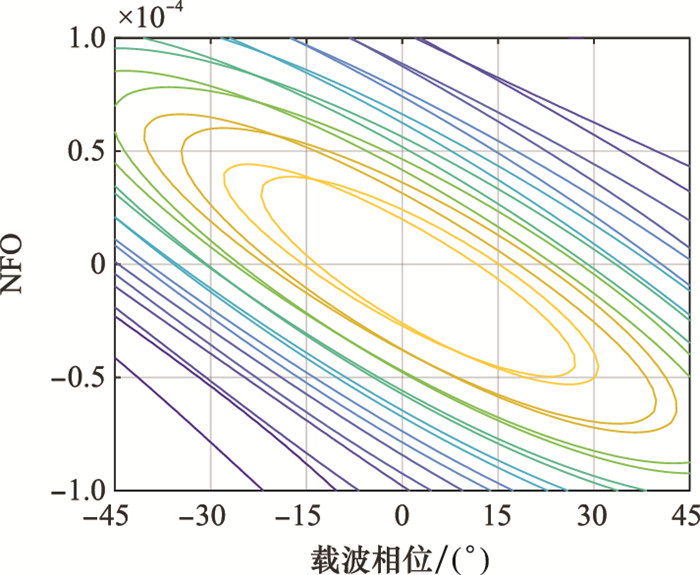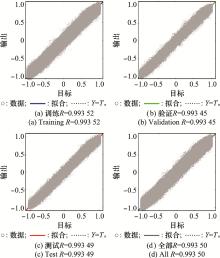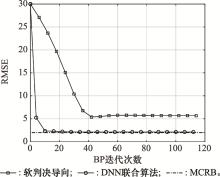Systems Engineering and Electronics ›› 2024, Vol. 46 ›› Issue (11): 3893-3900.doi: 10.12305/j.issn.1001-506X.2024.11.31
• Communications and Networks • Previous Articles Next Articles
Low-complexity iterative synchronization algorithm incorporating DNN for joint demodulation decoding
Yongsheng CUI1,2, Yafeng ZHAN1,*, Taiyi CHEN1,2, Xin FANG3
- 1. Beijing National Research Center for Information Science and Technology, Tsinghua University, Beijing 100084, China
2. Department of Electronic Engineering, Tsinghua University, Beijing 100084, China
3. Electric Power Research Institute, State Grid Jiangsu Electric Power Co., Ltd., Nanjing 210024, China
-
Received:2023-10-27Online:2024-10-28Published:2024-11-30 -
Contact:Yafeng ZHAN
CLC Number:
Cite this article
Yongsheng CUI, Yafeng ZHAN, Taiyi CHEN, Xin FANG. Low-complexity iterative synchronization algorithm incorporating DNN for joint demodulation decoding[J]. Systems Engineering and Electronics, 2024, 46(11): 3893-3900.
share this article
| 1 |
MAN X , ZHAI H T , YANG J , et al. Improved code-aided symbol timing recovery with large estimation range for LDPC-coded systems[J]. IEEE Communications Letters, 2013, 17 (5): 1008- 1011.
doi: 10.1109/LCOMM.2013.040213.130247 |
| 2 |
OH W , CHEUN K . Joint decoding and carrier phase recovery algorithm for turbo codes[J]. IEEE Communications Letters, 2001, 5 (9): 375- 377.
doi: 10.1109/4234.951382 |
| 3 |
MIELCZAREK B , SVENSSON A . Timing error recovery in turbo-coded systems on awgn channels[J]. IEEE Trans. on Communications, 2002, 50 (10): 1584- 1592.
doi: 10.1109/TCOMM.2002.803976 |
| 4 |
LEE D U , VALLES E L , VILLASENOR J D , et al. Joint LDPC decoding and timing recovery using code constraint feedback[J]. IEEE Communications Letters, 2006, 10 (3): 189- 191.
doi: 10.1109/LCOMM.2006.1603380 |
| 5 |
LEE D U , KIM H , JONES C R , et al. Pilotless frame synchronization via LDPC code constraint feedback[J]. IEEE Communications Letters, 2007, 11 (8): 683- 685.
doi: 10.1109/LCOMM.2007.070525 |
| 6 |
IMAD R , HOUCKE S . Theoretical analysis of a MAP based blind frame synchronizer[J]. IEEE Trans. on Wireless Communications, 2009, 8 (11): 5472- 5476.
doi: 10.1109/TWC.2009.090410 |
| 7 |
IMAD R , SICOT G , HOUCKE S . Blind frame synchronization for error correcting codes having a sparse parity check matrix[J]. IEEE Trans. on Communications, 2009, 57 (6): 1574- 1577.
doi: 10.1109/TCOMM.2009.06.070445 |
| 8 | CHEN T Y, ZHAN Y F, XIE H R, et al. Code-aided carrier synchronization with adjustable operating ranges for satellite communications[C]//Proc. of the International Wireless Communications and Mobile Computing, 2023: 806-811. |
| 9 |
ZHANG L , BURR A G . Iterative carrier phase recovery suited to turbo-coded systems[J]. IEEE Trans. on Wireless Communications, 2004, 3 (6): 2267- 2276.
doi: 10.1109/TWC.2004.837407 |
| 10 | BEST R E , KUZNETSOV N V , LEONOV G A , et al. Simulation of analog costas loop circuits[J]. International Journal of Automation and Computing, 2015, 11 (6): 571- 579. |
| 11 | LOTTICI V, LUISE M. Carrier phase recovery for turbo-coded linear modulations[C]//Proc. of the IEEE International Conference on Communications, 2002: 1541-1545. |
| 12 |
LOTTICI V , LUISE M . Embedding carrier phase recovery into iterative decoding of turbo-coded linear modulations[J]. IEEE Trans. on Communications, 2004, 52 (4): 661- 669.
doi: 10.1109/TCOMM.2004.826353 |
| 13 |
RAHAMIM Y , FREEDMAN A , REICHMAN A . ML iterative soft-decision-directed (ML-ISDD): a carrier synchronization system for short packet turbo coded communication[J]. IEEE Trans. on Communications, 2008, 56 (7): 1169- 1177.
doi: 10.1109/TCOMM.2008.040598 |
| 14 | MENG Z K, ZHANG H L, WANG W, et al. A simplified code-aided carrier synchronization algorithm[C]//Proc. of the 2nd International Conference on Safety Produce Informatization, 2019: 283-286. |
| 15 | 万增然. 深空通信中Turbo码联合解调译码技术研究及实现[D]. 北京: 清华大学, 2011. |
| WAN Z R. Research and realization of Turbo code joint demodulation and decoding technology in deep space communication[D]. Beijing: Tsinghua University, 2011. | |
| 16 | WANG J W, JIANG C X, KUANG L L, et al. Iterative doppler frequency offset estimation in low snr satellite communications[C]//Proc. of the International Wireless Communications and Mobile Computing, 2020: 36-41. |
| 17 |
WANG J W , JIANG C X , KUANG L L , et al. Iterative doppler frequency offset estimation in satellite high-mobility communications[J]. IEEE Journal on Selected Areas in Communications, 2020, 38 (12): 2875- 2888.
doi: 10.1109/JSAC.2020.3005497 |
| 18 | NOELS N, HERZET C, DEJONGHE A, et al. Turbo synchronization: an EM algorithm interpretation[C]//Proc. of the IEEE International Conference on Communications, 2003: 2933-2937. |
| 19 |
NOELS N , LOTTICI V , DEJONGHE A , et al. A theoretical framework for soft-information-based synchronization in iterative (turbo) receivers[J]. Journal on Wireless Communications and Networking, 2005, 2005, 576206.
doi: 10.1155/WCN.2005.117 |
| 20 |
CASSARO T M , GEORGHIADES C N . Frame synchronization for coded systems over awgn channels[J]. IEEE Trans. on Communications, 2004, 52 (3): 484- 489.
doi: 10.1109/TCOMM.2004.823636 |
| 21 | 张儒源. 深空通信低信噪比下信号接收关键技术研究[D]. 北京: 清华大学, 2014. |
| ZHANG R Y. Research on key technology of signal reception under low signal-to-noise ratio for deep space communication[D]. Beijing: Tsinghua University, 2014. | |
| 22 | 包建荣. 深空通信极低信噪比接收技术研究[D]. 北京: 清华大学, 2009. |
| BAO J R. Research on very low signal-to-noise ratio reception technology for deep space communication[D]. Beijing: Tsinghua University, 2009. |
| [1] | Ruibin ZHANG, Mengtao ZHU, Yunjie LI. Radar transmitting signal generation method for modulation recognition network stealth [J]. Systems Engineering and Electronics, 2024, 46(7): 2256-2268. |
| [2] | Yunwen FENG, Weihuang PAN, Cheng LU, Jiaqi LIU. Optimization of dynamic maintenance task interval for domestic civil aircraft based on operation data [J]. Systems Engineering and Electronics, 2023, 45(4): 1231-1238. |
| [3] | Tianyi JIA, Jingjie GAO, Xiaohong SHEN, Hongwei LIU. Moving underwater vehicle localization with uncertain sound speed [J]. Systems Engineering and Electronics, 2022, 44(9): 2699-2706. |
| [4] | Guan WANG, Haizhong RU, Dali ZHANG, Guangcheng MA, Hongwei XIA. Design of intelligent control system for flexible hypersonic vehicle [J]. Systems Engineering and Electronics, 2022, 44(7): 2276-2285. |
| [5] | Yi LIU, Xiaoxiong ZHOU, Guangjun CHENG. High dynamic carrier tracking technology in frequency hopping systems [J]. Systems Engineering and Electronics, 2022, 44(2): 677-683. |
| [6] | Buhua LIU, Dan DING, Liu YANG, Naiyang XUE, Zhongqian LIU. OFDM data transmission technology of UAV based on deep neural network [J]. Systems Engineering and Electronics, 2022, 44(2): 696-702. |
| [7] | Yaohua XU, Chenglong ZHU, Yi WANG, Fang JANG, Mengqin DING, Huiping WANG. Neural network-based algorithm for high-parallelism massive MIMO signal detection [J]. Systems Engineering and Electronics, 2022, 44(12): 3843-3849. |
| [8] | Yan WANG, Yimin SHI. Statistical analysis of the dependent competing risks model under the double constant-stress accelerated life test [J]. Systems Engineering and Electronics, 2020, 42(11): 2644-2653. |
| [9] | ZHANG Jun, HU Shengliang, YANG Qing, FAN Xueman. RCS statistical features and recognition model of air floating corner reflector [J]. Systems Engineering and Electronics, 2019, 41(4): 780-786. |
| [10] | CHEN Xudan, SUN Xinli, JI Guoxun, LI Zhen. Mis-specification analysis of inverse Gaussian degradation processes model [J]. Systems Engineering and Electronics, 2019, 41(3): 693-700. |
| [11] | CAI Zhongyi, XIANG Huachun, WANG Pan, WANG Zezhou, LI Chao. Missile storage lifetime assessment of multivariate degradation modeling under competition failure [J]. Systems Engineering and Electronics, 2018, 40(5): 1183-1188. |
| [12] | XU Bo, LIU Dezheng, ZHANG Xun. Multiple AUV cooperative navigation algorithm of robust filter based on interacting model [J]. Systems Engineering and Electronics, 2017, 39(9): 2087-2093. |
| [13] | LIU Yanchao, SHI Yimin, SHI Xiaolin. Reliability analysis of four-unit hybrid systems with masked data [J]. Systems Engineering and Electronics, 2017, 39(5): 1183-1188. |
| [14] | JIN Yan, GAO Duo, JI Hongbing. Parameter estimation of LFM signal based on robust S transform in α stable distribution noise [J]. Systems Engineering and Electronics, 2017, 39(4): 693-699. |
| [15] | DI Ruo-hai, GAO Xiao-guang, GUO Zhi-gao. Discrete Bayesian network parameter learning based on monotonic constraint [J]. Systems Engineering and Electronics, 2014, 36(2): 272-277. |
| Viewed | ||||||
|
Full text |
|
|||||
|
Abstract |
|
|||||































